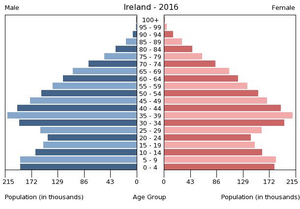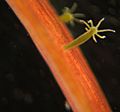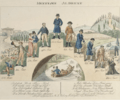Ageing facts for kids
Ageing is the natural process of change that happens to a living thing over time. For humans, ageing involves many physical and mental changes as we grow older.
The scientific word for the biological process that causes ageing is senescence. Scientists have tried for a long time to understand why animals, especially humans, get old.
One way to think about ageing is that it starts right after birth. This is when cell division and growth happen fastest. Over time, these processes slowly become less active.
Another way to look at ageing is when the chance of death starts to go up. Special charts called actuarial tables show how likely a person is to die at different ages. These tables help insurance companies figure out prices for life insurance and pension plans.
It turns out that people are least likely to die when they are young adults. For girls, this can be as early as 14. Biologists like Peter Medawar and George C. Williams suggest this is because this age was most important for having babies in the past. They believe the peak age for reproduction in human history was younger than it is today.
Why Do We Age?
A gene can be active at different times in a person's life. If a gene had a negative effect on a person's ability to have children, it would be less likely to be passed on. This means fewer such genes would be in the population over time. So, natural selection would mostly remove any inherited traits that reduced the ability to have children.
However, later in life, inherited problems have little or no effect on the whole population. This is because people have usually already had children by then.
Also, as we live, our cells collect damage to their DNA. This damage happens randomly. It causes us to become less healthy as we get older. Some types of cells, like muscle cells and most brain cells, do not divide or divide very rarely in adult life. These cells collect damage, not just to their DNA.
We also inherit some genetic conditions that show up later in life, such as Huntington's chorea. So, ageing happens because of two main things: inherited problems that appear later in life, and the build-up of damage in our cells.
Cells and Ageing
Simple organisms called protists do not age. They just divide, and the new generation is just as strong as the last. Why do even our dividing cells collect damage? Scientists don't fully know the answer. It might be linked to something called the Hayflick limit, which is about how many times a cell can divide.
Related pages
Images for kids
-
A grandmother and her grandchild watching the Nowruz ceremony, showing stark contrast in physical appearance
-
Immortal Hydra, a relative of the jellyfish
-
Comparison of a normal aged brain (left) and a brain affected by Alzheimer's disease
-
Christoffer Wilhelm Eckersberg: Ages of Man
See also
 In Spanish: Envejecimiento humano para niños
In Spanish: Envejecimiento humano para niños
 | James Van Der Zee |
 | Alma Thomas |
 | Ellis Wilson |
 | Margaret Taylor-Burroughs |










